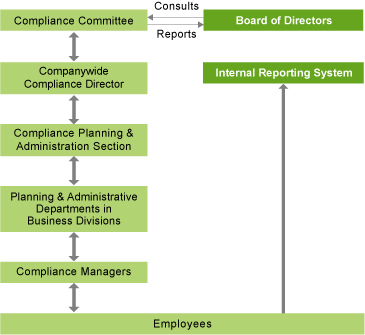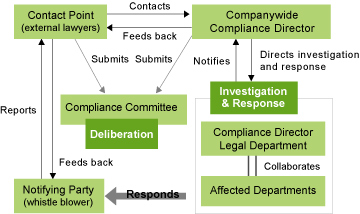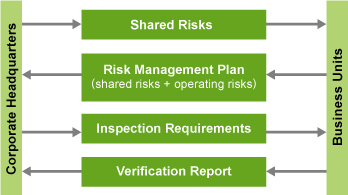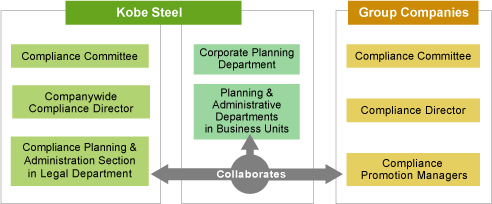Home > About Us > Sustainability Management > Sustainability Report > Sustainability Report 2012 > Enforcing and Strengthening Compliance
 Enforcing and Strengthening Compliance
Enforcing and Strengthening Compliance
We regard compliance as a prerequisite for Kobe Steel's continued survival. We will continue to implement a range of measures aimed at firmly establishing compliance, spearheaded by executive officers, in order to create a groupwide organizational culture that is highly sensitive to compliance.
Compliance System
![]()
Kobe Steel has a Compliance Committee that advises the Board of Directors. Two of its members are company directors. Five come from outside the company in order to maintain fairness and neutrality. The Committee proposes recommended plans, checks on progress, and deliberates cases reported through the internal reporting (whistleblowing) system.
We have appointed an executive vice president as the companywide compliance director and a senior officer responsible for compliance. We have also set up a dedicated Compliance Planning & Administration Section in the Legal Department to work in partnership with planning and administrative departments in the business units and compliance managers in other departments.

Compliance Education
![]()

We incorporate compliance-related content into every level of training and provide opportunities for employees to receive a broad range of training at different points in their careers, including Compliance Top Seminars for executives at Kobe Steel and other group companies. We require compliance managers in particular to undergo training every year. We also run legal education courses via e-learning every year, to give all employees the opportunity to check their level of compliance awareness.
Compliance Manuals
![]()
The specific contents of our Standards of Corporate Conduct, which form part of our Corporate Code of Ethics, are explained in greater detail in the Conduct Guide for Employees, which is distributed to all employees as a groupwide compliance manual. The guide also serves as a basic manual for groupwide risk management, focusing particularly on "shared risks" that are applicable to all group companies as part of their risk management activities (see below).
In addition to this, we compile more detailed manuals dealing with specific laws and regulations, including the Antimonopoly Act, Subcontractors Act, Act on the Protection of Personal Information and Security Export Controls. Manuals provide an easy source of reference whenever employees have queries during the course of their duties.

Detailed manuals
-
 Antimonopoly Act Compliance Manual
Antimonopoly Act Compliance Manual -
 Subcontractors Act Compliance Manual
Subcontractors Act Compliance Manual -
 Intellectual Property Information (intranet)
Intellectual Property Information (intranet) -
 Personal Data Management Manual
Personal Data Management Manual -
 Confidential Information Guidelines and Management Manual
Confidential Information Guidelines and Management Manual -
 Security Export Control website
Security Export Control website -
 Manual on Dealing with Malicious Activity
Manual on Dealing with Malicious Activity -
 Manual on Relationships with Public Officials
Manual on Relationships with Public Officials -
 Sexual Harassment Prevention Manual
Sexual Harassment Prevention Manual
Internal Reporting System
![]()
Our internal reporting (whistleblowing) system is one of the methods we use to prevent risks associated with legal, ethical and other compliance-related issues from materializing and spreading, by quickly identifying problems and implementing appropriate measures. If employees come across any form of illegal conduct within the company, the system enables them to report the matter directly to a designated lawyer outside the company in a neutral environment. The contents of such reports are then investigated by the Compliance Committee and appropriate action is taken. We have also rolled out similar systems to other group companies.

Risk Management Activities
![]()
The aim of risk management activities at the Kobe Steel Group is to enable individual departments to identify risks and take remedial action by themselves.
Every department formulates and implements their own Risk Management Plan, based on "operating risks" applicable to their own operations and "shared risks" specified by the relevant staff department at corporate headquarters based on regulatory revisions and social changes. At the end of the fiscal year, the heads of each business unit and department, including top management, review and check the results of risk management activities over the course of the year and provide feedback for the following year.
Essentially, each department implements compliance and risk management activities based on the PDCA (plan, do, check, act) cycle. The aim of ongoing activities such as these is to establish an organizational culture that is highly sensitive to compliance, within the context of individual operations.

Group Initiatives
![]()
We have established Compliance Committees or equivalent bodies at all group companies, drawn up a set of Kobe Steel Group Corporate Code of Ethics and introduced an internal reporting system. Group companies also appoint compliance directors and compliance promotion managers, whose roles are to coordinate with Kobe Steel and promote activities within their respective companies. Risk management activities are carried out at all group companies along the same lines as at Kobe Steel.

Creating a Corporate Group Highly Sensitive to Compliance

Executive Vice President,
Companywide Compliance Director
Having set out KOBELCO VISION "G" as our medium- to long-term vision for the Kobe Steel Group, we are working on a range of initiatives to make that vision a reality. Above all, we need effective systems to ensure safety, disaster prevention and compliance. These represent the cornerstones of our business activities and are prerequisites for the group’s continued survival.
As well as establishing and maintaining a groupwide compliance system, including organizing compliance education and compiling manuals, individual departments and group companies also engage in ongoing risk management activities. This means identifying compliance risks and taking remedial action. Our aim is to foster and establish an organizational culture that is highly sensitive to compliance.


